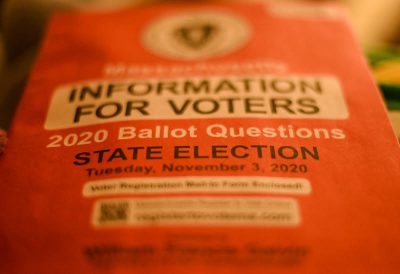Massachusetts voters will decide this November if car owners and independent repair shops should have more access to vehicle mechanical data.

Question 1 on the November ballot will have Massachusetts voters decide on the Right to Repair law, which would give car owners and independent repair shops more access to vehicle mechanical data. LAURYN ALLEN/ DAILY FREE PRESS STAFF
If passed, the law would require vehicle manufacturers to introduce a standardized open platform for telematics on their cars, allowing owners and third parties to access diagnostic data.
The 2020 Right to Repair bill would extend the state’s existing legislation to cover telemetrics — data wirelessly transmitted from a vehicle to an external receiving point — which were previously exempt.
The proposed law will be Question 1 on the state’s November ballot. The other initiative, Question 2, would introduce ranked-choice voting to the Commonwealth if passed.
This ballot initiative would allow consumers access to their vehicle’s digital diagnostic and manufacturing information. Tommy Hickey, director of the Massachusetts Right to Repair Coalition, said it allows for a “level playing field” for independent repair shops.
“This is simple economics, supply and demand,” Hickey said. “More options for repair allows consumers more convenience and better pricing.”
Massachusetts was the first state in the country to pass a “right-to-repair” law in 2012, which mandated that car manufacturers give independent shops the same information that they give their own franchise dealerships.
Hickey said The 2020 initiative would update the law to meet advances in telematics technology.
“Everything is wireless now … literally the entire world is trying to get wires out of it,” Hickey said, “By this year, 2020, 90 percent of new cars have this new technology, and it’s carved out of the [current] law.”
If this initiative is not passed, Hickey said, dealerships, which currently charge about 37 percent more than independent repair shops, would continue to be the only place with access to telematics information, giving them a major competitive advantage.
Hickey said his organization sees Massachusetts as a “battleground state” on this issue, and one he hopes would inspire federal action. He said he is “very optimistic” that the ballot will pass in November.
However, Conor Yunits, a spokesperson for the Coalition for Safe and Secure Data, said this ballot initiative is not about repairs, but about broader data.
Consumers and repair shops already have the means to access diagnostic data by plugging into the car directly, Yunits said. He said this initiative would give shops access to additional information such as GPS data and emergency response information.
“A lot of the information is not … necessary to fix your car,” Yunits said. “That is specifically excluded under current law. It is not specifically excluded under Question 1.”
Yunits said industry groups such as the Auto Care Association and auto part companies such as Napa and O’Reilly Auto Parts have given millions of dollars to passing this initiative as a means of obtaining consumer data.
“Part suppliers, they don’t care about repair issues. They care about selling parts. They care about selling data and information,” Yunits said. “That’s what’s at play here. This is a question about data, and these companies trying to get access to more than they need.”
There are alternatives to this initiative that have already been implemented in other places, Yunits said. For example, BMW has its own platform that allows consumers to access telematics data and choose which third parties can see it. The service, initially launched in Europe in 2017, was introduced to the United States in July.
“It’s all through the server securely,” Yunits said, “and never is there a direct access between that third party or the consumer and the vehicle itself.”
Yunits said the risk comes not only from the ability to download a vehicle’s data, but also to upload data to it, opening vehicle owners up to malicious action from third parties.
“The risk we’re talking about here is not local repair shops, it’s not the trusted mechanic that most people want to go to,” Yunits said. “But when you create a system like this, where there’s one point of access and then once you’re in there, you’re in the car, it’s incredibly easy for hackers to get through.”
He said both the FBI and National Highway Traffic Safety Administration have warned about such potential threats. If a vehicle is hacked, Yunits said, malware or ransomware could be uploaded to it, and it may even be caused to crash.
Yunits said this is a complex issue, and that his organization is working to educate voters within the next few weeks.
“That’s all we’re trying to do, is ensure the people understand this is not about repair, this is about data,” Yunits said. “It’s a misleading approach, it’s a misleading question. And our goal is just to make sure that as many people as possible understand that before Election Day.”




